Baker Academic Craig L. Blomberg Collection (5 vols.)
Digital Logos Edition
Overview
New Testament specialist Craig Blomberg presents a sturdy shelf of works from Baker Academic and Brazos Press. In this collection, you’ll get a variety of theological, exegetical, and hermeneutical resources that center on the Bible’s timeless sufficiency and divine inspiration. Get the most out of your New Testament studies, whether you preach the New Testament’s message for conversion or teach the New Testament for the next generation of disciples.
The collection leads with A Handbook of New Testament Exegesis, a standard reference work in the field if exegetical study. You’ll also get his preaching text on the parables, as well as his response to “Left Behind” eschatology.
In the Logos editions, volumes from the Baker Academic Craig Blomberg Collection are enhanced by amazing functionality. Scripture citations link directly to English translations, and important terms link to dictionaries, encyclopedias, and a wealth of other resources in your digital library. Perform powerful searches to find exactly what you’re looking for. Take the discussion with you using tablet and mobile apps. With Logos Bible Software, the most efficient and comprehensive research tools are in one place, so you get the most out of your study.
Key Features
- Studies on the New Testament for preachers, exegetes, students, and teachers
- Blomberg’s response to the popular “Left Behind” eschatology
- Defense of the primacy and timelessness of Scripture
Product Details
- Title: Baker Academic Craig L. Blomberg Collection
- Author: Craig L. Blomberg
- Volumes: 5
- Pages: 1,262
- Christian Group: Evangelicals
- Resource Type: Collected Works
- Topic: Biblical Studies, Exegesis
As Seen on Faithlife Today
Individual Titles
- A Handbook of New Testament Exegesis by Craig L. Blomberg and Jennifer Foutz Markley
- Making Sense of the New Testament: Three Crucial Questions by Craig L. Blomberg
- Preaching the Parables: From Responsible Interpretation to Powerful Proclamation by Craig L. Blomberg
- Can We Still Believe the Bible? by Craig L. Blomberg
- A Case for Historic Premillennialism: An Alternative “Left Behind” Eschatology edited by Craig L. Blomberg and Sung Wook Chung
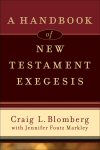
This accessible handbook provides a one-stop guide to the New Testament exegetical method. Seasoned New Testament scholar Craig Blomberg and his former research assistant Jennifer Foutz Markley offer both a broad overview of the exegetical process and a step-by-step approach to studying the New Testament in depth, helping readers understand the text and discuss it responsibly. The book is full of examples—interesting or controversial New Testament texts in the interpretation of which the methods under discussion truly make a difference. Professors and students in New Testament, Greek, hermeneutics, and exegesis courses as well as those involved in ministry will value this work’s sound guidance, balanced approach, and manageable size.
Blomberg and Foutz Markley have written a wonderfully clear and accessible handbook for New Testament exegesis. The book covers the various steps of the exegetical process and gives sane and sage advice throughout. What makes the book especially illuminating and interesting are the many examples from the New Testament that illustrate the principles discussed. Professors and students will be grateful for a work that is exegetically rigorous, theologically informed, and practically useful.
—Thomas R. Schreiner, James Buchanan Harrison Professor of New Testament Interpretation, Southern Baptist Theological Seminary
In this immensely practical guide to New Testament exegesis, seasoned New Testament scholar Craig Blomberg teams up with Jennifer Foutz Markley to produce another winner. The text walks the student through all key aspects of New Testament interpretation, striking just the right balance between scholarly acumen and simplicity of presentation.
—Mark L. Strauss, professor of New Testament, Bethel Seminary San Diego
The process of Greek exegesis, starting at textual criticism and moving all the way to contextualization, can prove a daunting task for students and ministry leaders alike. Blomberg and Foutz Markley’s handbook promises to be a helpful guide along the way. Clearly written, it emphasizes the specific skills necessary for exegesis and explores practical issues of New Testament interpretation. The consistent use of biblical texts to illustrate a particular skill or guideline is an especially compelling feature of the book. Helpful and practical.
—Jeannine Brown, professor of New Testament, Bethel Seminary
Among the many discussions of the interpretation of Scripture that have appeared lately, this is one of the best and most helpful. Concise and readable, it nevertheless interacts at a high level with the field of hermeneutics. This is a treasure trove of principles for the complex task of understanding Scripture. It covers the major aspects of Bible study and does so with a good explanation of the various nuances of interpretation, providing practical examples from the New Testament. It is a must-read for the serious student of the Word.
—Grant Osborne, professor of New Testament, Trinity Evangelical Divinity School
New Testament teachers and students, along with pastors seeking a refresher, stand to gain from this recent overview of biblical exegesis. . . . Blomberg and Foutz Markley sketch a historical-grammatical approach that squares well with exegesis classes taught in evangelical seminaries. Their contribution to the field of exegetical handbooks and introductions is a readable and comprehensive primer housed in a step-by-step methodological framework. . . . Clear writing and a steady stream of examples, along with a wide breadth of issues addressed in each exegetical step, make this book a promising resource for students, teachers, and pastors. It demonstrates well the necessity of rigorous, self-aware, and thoughtful exegesis for followers of Scripture.
Seminary instructors and others who teach New Testament exegesis will want to take a close look at this new handbook. . . . The wording and organization of the volume are lucid and engaging. . . . The authors give students plenty of guidance for further study in the footnotes, which introduce them in an evenhanded way to the broader world of New Testament studies. . . . The particular strength of this addition to the many guides to New Testament exegesis on the market is its clear and user-friendly narrative explanation of each step. Even without classroom visuals and additional instructor comments, I could imagine a student learning the nuts and bolts of the process simply by reading. . . . This new Handbook deserves serious consideration as a textbook for seminary courses and even for the interested individual who cannot attend a class.
Jennifer Foutz Markley serves Denver Seminary as an admissions counselor.
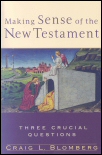
Many Christians assume that the New Testament is historically reliable. This confidence, however, is not universal, and there are many who, especially in light of modern biblical studies, question this claim. Some have also claimed that Paul founded a church quite distinct from the message of Jesus and the Gospels. How can we reconcile their seeming differences? What is the relevance of the New Testament in the world today, in cultures far removed in time and space from the first-century Mediterranean world?
Grounded in sound scholarship but written in an accessible style, this book provides a reasonable, well-informed response to these issues, offering sound introductory guidance to any student of the Bible.
As always, Craig Blomberg is lucid, sensible, and interesting. The book’s organization and style are deceptively simple. Even the mature Christian reader will benefit from Blomberg’s mastery of so much material nicely summarized and evaluated here. Blomberg offers just enough detail to keep us interested in the hard evidence but not so much as to make us feel swamped by minutiae. This book could be confidently placed into the hands of friends who are generally well read but who are nevertheless biblically illiterate, for Blomberg’s mix of sane historical assessment, thoughtful theology, and elementary principles of interpretation open many doors. I hope this book will find many diverse readers and a long life.
—D. A. Carson, research professor, Trinity Evangelical Divinity School
Some New Testament scholars major in minutiae and stay away from the big historical and literary questions, but Blomberg is not one of them. In Making Sense of the New Testament, Blomberg tackles the big issues of the historical reliability of the New Testament—the similarities and differences between the teachings of Jesus and Paul and the various issues of literary criticism—with vim, vigor, and vitality. His study is marked by careful, well-documented scholarship and a well-argued case. This book is an excellent starting place for those who want to discuss the New Testament with a skeptical postmodern audience.
—Ben Witherington III, professor of New Testament interpretation, Asbury Theological Seminary
Craig Blomberg is an ideal scholar to introduce the three crucial questions addressed in this book. He has distinguished himself before in important treatments of these topics, and here he provides an excellent, readable introduction that will profit basic and advanced readers alike. His treatment reflects exceptionally clear, original thinking as well as thorough familiarity with wider scholarly discussion.
—Craig Keener, professor of New Testament, Asbury Theological Seminary
In addressing three crucial questions, Blomberg has given us an imposing, crisply written apologetic that is at once relevant, fair-minded, and comprehensive. This is a worthy companion to Longman’s parallel text for the Old Testament.
—Paul Barnett, teaching fellow, Regent College
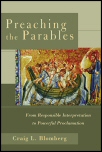
Craig Blomberg demonstrates how the structure of a parable is key to its interpretation and thus to its exposition. He shows how a parable, when properly contemporized, can be a powerful rhetorical device. He also illustrates how recognizing the elements of the parable that were atypical to everyday life can lead to key insights that will be of significance to contemporary parishioners. Each of the 15 exemplary sermons is accompanied by an analysis that points out key interpretive decisions.
Craig Blomberg is a superb teacher and expert on the parables. Here he effectively combines both gifts. This book discusses how to preach the parables and gives a wonderful sample of sermons with explanations about how to proceed. I can’t imagine a more helpful pastoral and homiletical guide to the perplexing world of parables. Highly recommended.
—Darrell Bock, research professor of New Testament studies and professor of spiritual development and culture, Dallas Theological Seminary
Jesus’ parables are endlessly intriguing. But pastors don’t find them easy going—far too often we get mired in clichés and moralisms. Blomberg’s venture into these classic texts is a welcome antidote to pulpit fatigue. His sermons themselves are fresh and personal; his accompanying commentary on how he came to preach them the way he does is on-the-job training for making honest gospel sermons from the stories Jesus told.
—Eugene H. Peterson, professor emeritus of spiritual theology, Regent College
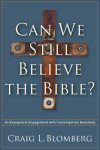
Challenges to the reliability of Scripture are common today. Distinguished biblical scholar Craig Blomberg offers an accessible and nuanced argument for the Bible’s reliability in response to the extreme views about Scripture and its authority articulated by both sides of the debate. He believes that a careful analysis of the relevant evidence shows we have reason to be more confident in the Bible than ever before. As he traces his own academic and spiritual journey, Blomberg sketches out the case for confidence in the Bible in spite of various challenges to the trustworthiness of Scripture, offering a positive, informed, and defensible approach.
Mention the Bible, especially a hot topic like canon or miracles, and one second later you will hear strident voices attacking the Bible’s silliness or calling others names for not believing the Bible. Those topics, and many more besides, are volatile because they matter, and what matters most for the discussion is the voice of reason and balance. Enter Craig Blomberg with nothing less than a splendid example of ‘generous apologetics’ for the faith. Whether you agree on specific points, this is the finest example I know of for how to defend the Bible.
—Scot McKnight, professor of New Testament, Northern Seminary
The Bible has gone from being the answer to being the question in our culture. Can I still believe what it claims? Answering emphatically yes, Blomberg examines the pitfalls of making the Bible say too little or too much, both real problems for understanding how the Bible works. So read and consider anew how to think about Scripture. The result will be that belief in the Bible makes sense.
—Darrell Bock, executive director of cultural engagement and senior research professor of New Testament studies, Dallas Theological Seminary
Craig Blomberg’s defense of the Scriptures’ truthfulness is both important and timely. He keeps the main thing the main thing as he warns well-meaning believers about drawing rigid lines in the wrong places—and damaging the church’s witness—while dispelling myths and correcting distortions propounded by Christianity’s loudest critics. This book is a superb resource and guide regarding what the Bible’s trustworthiness means—and doesn’t mean.
—Paul Copan, professor and Pledger Family Chair of Philosophy and Ethics, Palm Beach Atlantic University
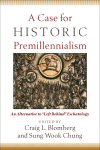
Twentieth and twenty-first-century American evangelicalism, particularly at the popular level, has been virtually saturated with the eschatology of dispensational premillennialism. The distinctive teachings of that system, in particular its affirmation of the pretribulation rapture of the church, have become so pervasive that many evangelicals would be hard pressed to identify an alternative approach. Popular novels that disseminate dispensationalism to a wider readership have only furthered that trend.
The contributors to this volume provide a thoughtful alternative. They present compelling arguments for historic or classic premillennialism—a position widely held throughout church history (and popularly advanced in the writings of George Eldon Ladd). An introductory chapter examines the differences within premillennial eschatology and considers reasons for the widespread popularity of dispensationalism in the twentieth century. This is followed by biblical, theological, historical, and missiological studies that reexamine classic premillennialism, particularly with regard to its understanding of the return of Christ.
The authors, all respected scholars in their fields, present arguments for a return to an eschatological theology that was widely held for many centuries. Their engaging studies should be of great interest to evangelical readers—both in the academy and in the church.
Contributors:
- Craig L. Blomberg
- Oscar A. Campos
- Sung Wook Chung
- Helene Dallaire
- Donald Fairbairn
- Richard S. Hess
- Don J. Payne
- Timothy P. Weber
It’s about time we had a scholarly presentation and defense of historic premillennialism, which is probably the majority view of the ‘end times’ among theologically trained evangelicals. These authors are eminently qualified to give us that, and here they have done it. All evangelicals and others interested in alternatives to the popular folk religious beliefs about the ‘end times’ must read this book. If read carefully by many, it will turn the growing tide of ‘pretrib rapturism’ and restore the eschatology of the Bible and the church fathers.
—Roger E. Olson, professor of theology, George W. Truett Theological Seminary, Baylor University
This book provides a welcome alternative to popular notions of the end-times, which sometimes seem to be recycled news headlines. Particularly helpful is the book’s critique of ‘left-behind’ theology, which I believe can be defended only by taking a lot of Scripture out of context.
—Craig S. Keener, professor of New Testament, Asbury Theological Seminary
A welcome conversation piece in eschatological studies. . . . It is recommended for students, pastors, and scholars.
—Theological Book Review
[This] volume represents a more formal and sustained presentation of historic premillennialism than has been offered since the work of the late George Eldon Ladd. . . . A Case for Historic Premillennialism is a valuable contribution to millennial discussions.
—Trinity Journal
Blomberg and Chung offer a generally readable and interesting collection of essays arguing for the relative merits of the historic version [of premillennialism], as well as for the merits of premillennialism in general. . . . This edited volume covers most of the topics in good introductory fashion.
—Christian Reflection
The authors of these essays are excellent scholars and their arguments in support of their views are presented well. They defend a legitimate Christian eschatological position and they do so competently. . . . This book is a helpful explanation and defense of posttribulational premillennialism. It is a good introduction to the biblical and historical support for that position and serves as a good place to start for those who desire to understand it better.
—Bibliotheca Sacra
Sung Wook Chung is an associate professor of Christian theology and the director of Korean Initiatives at Denver Seminary. He is the author of Karl Barth and Evangelical Theology and editor of Christ the One and Only: A Global Affirmation of the Uniqueness of Jesus Christ.
About Craig L. Blomberg
Craig Blomberg is distinguished professor of New Testament at Denver Seminary, where he has been teaching since 1986. Blomberg earned degrees from Augustana College, Trinity Divinity School, and Aberdeen University in Scotland. He previously taught at Palm Beach Atlantic College and spent one year in Cambridge as a research fellow with Tyndale House. He has been on translation committees for the New Living Translation, English Standard Version, and the Holman Christian Standard Bible.
Bloomberg is the author, coauthor, or coeditor of over 20 books and more than 80 articles in journals or multiauthor works. A recurring topic of interest in his writings is the historical reliability of the Scriptures, and he has also covered such diverse issues as wealth and poverty, hermeneutics, and women in ministry. His books include Jesus and the Gospels: An Introduction and Survey, 2nd ed., Zondervan Exegetical Commentary on the New Testament: James, A Handbook of New Testament Exegesis, Making Sense of the New Testament, Preaching the Parables, and The NIV Application Commentary: 1 Corinthians.

This title is included in the following collections
You can save when you purchase this product as part of a collection.
Craig Blomberg Biblical and Th...
$218.92$185.99Baker Ultimate Collection 2022...
$38,273.89$30,599.99